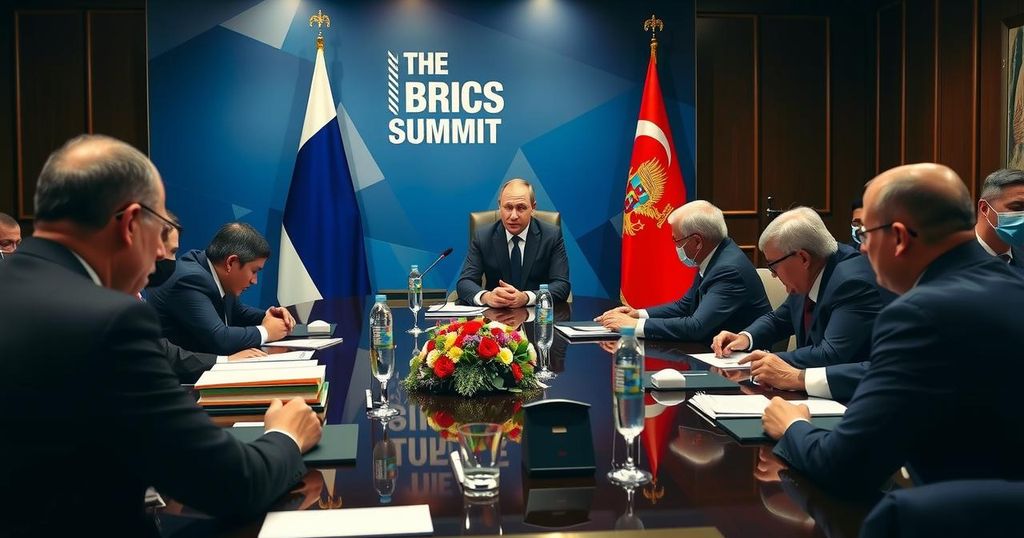Putin Hosts BRICS Summit, Enhancing Russia’s Influence and Promoting Global Cooperation
During the BRICS summit in Kazan, President Vladimir Putin aimed to augment Russia’s influence against Western powers, focusing on financial cooperation and alternative payment systems. Leaders from various nations, including China and India, participated in discussions about promoting regional peace and strengthening the BRICS coalition. President Xi highlighted the need for de-escalation in Ukraine, while Guterres called for an end to various conflicts, stressing a collective commitment to a multipolar world.
In Kazan, Russia, President Vladimir Putin presided over the BRICS summit, aiming to enhance Russia’s influence as a counterbalance to Western dominance. The gathering, which included leaders from nations such as China’s Xi Jinping and India’s Narendra Modi, discussed significant issues such as expanding financial cooperation to devise alternatives to Western payment systems and resolving regional disputes. This three-day conference also highlighted the growing BRICS coalition, now comprising members beyond the original five (Brazil, Russia, India, China, South Africa) to include Iran, Egypt, Ethiopia, the UAE, and Saudi Arabia, among others. Putin criticized Western practices, which he claims hinder the Global South’s development through unilateral sanctions and manipulation of financial systems. He argued that such tactics contribute to conflicts, particularly in Ukraine, which NATO countries allegedly exploit to threaten Russian security. Furthermore, Putin introduced the necessity of establishing a new payment system to enable Russia to bypass Western sanctions, aiming to strengthen ties with BRICS nations. The summit saw Xi expressing China’s commitment to global security and proposing a peace plan for Ukraine, although this has yet to gain traction. Notably, Guterres, the UN Secretary-General, called for an end to conflicts in Gaza, Lebanon, Ukraine, and Sudan during the proceedings, emphasizing the need for a just peace. Despite U.S. and allied attempts to diplomatically isolate Russia due to its invasion of Ukraine, the BRICS summit illustrated a significant gathering of nations asserting their collective influence against Western hegemony, asserting that the West risks isolating itself instead.
The BRICS summit represents a significant diplomatic effort by Russia to reinforce its global presence amidst increasing isolation due to its actions in Ukraine. This coalition of emerging economies aims to challenge Western dominance in global affairs by fostering deeper economic cooperation and mutual support among its member nations. The summit’s expansion to include countries such as Iran, Saudi Arabia, and others exemplifies a shift in geopolitical alliances, as developing nations seek to carve out a more prominent role on the world stage. The discussions around establishing alternative payment systems reflect a critical strategic move to decrease reliance on Western financial structures, thereby enhancing economic sovereignty for BRICS members.
The BRICS summit successfully showcased an evolving coalition of nations united in their ambition to establish a multipolar world, countering Western influence and addressing regional conflicts collaboratively. President Putin’s critical reflections on Western sanctions and the emphasis on financial independence signal a strategic pivot for Russia amidst geopolitical pressures. The collective stance taken by BRICS nations, alongside the presence of UN Secretary-General Antonio Guterres, underlines a collective commitment to peace and cooperation while navigating the complexities of international relations in the current global landscape.
Original Source: apnews.com




Post Comment